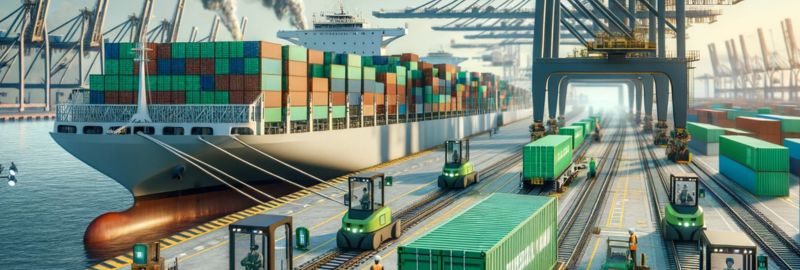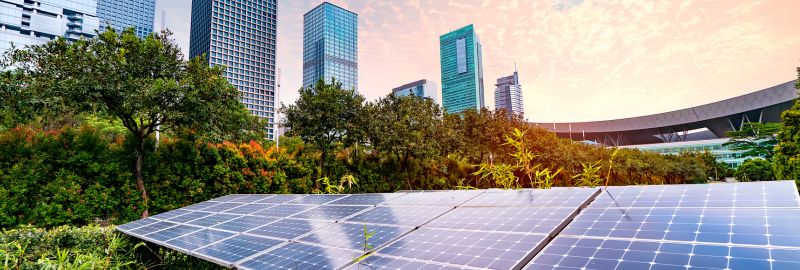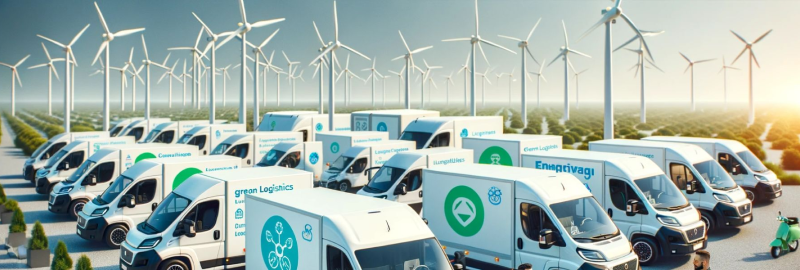According to the latest sustainability studies for 2023, climate change stands out as one of the top three concerns for consumer-oriented businesses.
In today's fast-paced global economy, sustainable logistics plays a pivotal role in shaping the future of business operations. By addressing environmental, economic, and societal challenges, it positions itself as an integral part of progressive business strategies.
According to the latest sustainability studies for 2023, climate change stands out as one of the top three concerns for consumer-oriented businesses.
As we delve deeper into the intricacies of sustainable logistics, four pivotal areas emerge:
- The Rising Significance of the Resale Market: Sustainability is not only about producing new goods but also maximizing the lifecycle of existing ones. The resale market, with its focus on reusing and repurposing, can play a pivotal role in reducing waste and carbon footprint. As consumers become more environmentally conscious, there's an increasing demand for quality pre-owned goods.
- Integrating Sustainability Practices Across the Supply Chain: It's imperative for companies to go beyond green initiatives in isolated pockets of their operation. A truly sustainable business will ensure that every link in its supply chain, from raw material sourcing to product delivery, is sustainable. This holistic approach minimizes environmental impact and fosters long-term business resilience.
- The Role of Technology in Sustainability: Advanced technologies, such as artificial intelligence, blockchain, and the Internet of Things (IoT), can significantly enhance supply chain transparency, efficiency, and sustainability. They enable businesses to monitor and optimize their operations in real-time, reducing waste, emissions, and costs.
- Compliance with ESG-related Regulations and Frameworks: ESG (Environmental, Social, and Governance) considerations are rapidly becoming a central component of business strategies. Companies are not just pursuing sustainability because it's "the right thing to do," but also because they are mandated by a growing body of regulations. Ensuring compliance while also genuinely embracing the spirit of these guidelines will be a defining characteristic of successful, sustainable businesses.
As we transition to a more sustainable future, understanding and implementing sustainable logistics will be crucial for businesses aiming to thrive in this changing landscape.
Defining Sustainable Logistics

Sustainable logistics essentially involves making logistics, goods, and transportation more sustainable, minimizing the environmental impact of the practices involved in these processes.
At its core, sustainable logistics seeks to balance operational efficiency with environmental responsibility. It's not just about transporting goods from point A to point B, but doing so in a way that reduces carbon footprint, conserves resources, and promotes social responsibility.
For instance, it looks at the packaging materials used. Are they biodegradable or recyclable? It evaluates transportation modes. Are companies using fuel-efficient vehicles or considering electric alternatives? Even the routes taken by delivery trucks, optimized for the shortest distance or least traffic, can make a difference in reducing emissions.
Furthermore, sustainable logistics considers the entire lifecycle of a product. This includes sourcing of materials, production, transportation, and even the product's end of life. Each stage offers opportunities for businesses to implement more eco-friendly practices.
Finally, collaboration plays a key role. By working with suppliers, customers, and even competitors, companies can share best practices, leverage shared transportation, and reduce overall environmental impact.
In sum, sustainable logistics is a comprehensive approach to business operations, ensuring that each step in the product's journey is as green and efficient as possible.
The Three Pillars of Sustainable Logistics

To truly grasp the depth of sustainable logistics, it's essential to understand its foundational structure, which rests upon three pillars. These pillars represent the comprehensive approach that sustainable logistics strives for, balancing the ecological, the economical, and the societal. Each is interdependent, ensuring that businesses don't prioritize one at the expense of the others.
Environmental Responsibility
The environment stands at the forefront of the sustainable logistics conversation. As logistics operations often contribute significantly to global emissions, there's an imperative to reduce the carbon footprint.
This means transitioning to cleaner fuels, optimizing routes to curtail unnecessary fuel consumption, and even looking into electric or hybrid delivery solutions.
Furthermore, it's not just about emissions. Waste management becomes pivotal, ensuring that materials are recycled or reused, and resource optimization ensures that no resources are wasted, from packaging materials to water in facilities.
Economic Viability
Sustainability and profitability can coexist harmoniously. The key is to find cost-efficiency in sustainable practices.
This might mean investing in energy-efficient warehouses that, in the long run, reduce utility bills. Or it could involve streamlining supply chains to reduce wastage, resulting in cost savings.
By integrating sustainable practices, businesses aren't just protecting the environment; they're setting themselves up for long-term economic success, as these practices often lead to financial benefits in the long run.
Social Responsibility
The human aspect of sustainable logistics cannot be overlooked. It's about more than just moving goods efficiently; it's about doing so while prioritizing the welfare and safety of every individual involved.
This means ensuring safe working conditions in warehouses, providing adequate training, and even ensuring ethical practices throughout the supply chain.
In sustainable logistics, businesses take an active role in bettering the communities they operate within and ensuring their practices uphold the highest ethical standards.
How to Implement Sustainable Logistics?
Achieving sustainable logistics requires a multifaceted approach, integrating best practices at various stages of the supply chain. Here are some key strategies to consider:
- Comprehensive Sustainability Assessment: Begin by evaluating your entire logistics strategy to identify areas where more sustainable practices can be introduced. This holistic view can uncover overlooked inefficiencies and potential improvements.
- Route Optimization: Minimize unnecessary travels and wait times. By optimizing routes, you can significantly reduce fuel consumption, resulting in both environmental and cost benefits.
- Incorporate Renewable Energy or Technology: Investigate the potential to integrate greener or renewable technologies into your logistics strategy. This might mean using solar panels at warehouses or investing in software that improves efficiency.
- Avoid Energy Waste with Capacity: Ensure your transportation containers are packed to their fullest capacity. By minimizing unused space, you're optimizing energy use and reducing costs.
- Sustainable Packaging: Shift towards recyclable or sustainable packaging materials. Not only does this reduce environmental impact, but it also meets the increasing consumer demand for eco-friendly packaging.
- Integrated Logistics: Align your supply chain across all departments. An integrated approach ensures that every part of your operation works harmoniously, enhancing overall efficiency.
- Greener Transportation Options: Whenever feasible, transition to eco-friendlier transport methods. This could mean electric trucks, biodiesel fuels, or even promoting non-motorized transport for last-mile deliveries.
By incorporating these strategies, businesses can pave the way for a logistics operation that not only meets today's standards but also prepares for a sustainable future.
Benefits of Sustainable Logistics

Sustainable logistics and supply chain management bring a wealth of benefits to both the environment and businesses. Let's explore some of the significant advantages they offer:
- Reduction in Emissions and Energy Consumption: Sustainable logistics inherently aims at reducing the carbon footprint. This not only conserves energy but also leads to significant savings in operational costs.
- Waste Reduction: By focusing on minimizing waste, businesses can craft a supply chain that's not only more efficient but also more profitable in the long run.
- Protection Against Reputational Damage: In a world where consumers are increasingly conscious about sustainability, companies that prioritize green practices can avoid negative publicity and maintain a positive brand image.
- Improved Supply Continuity: Diversifying the supply chain through sustainable measures can ensure a more consistent and reliable supply flow. This reduces potential disruptions and aids in smooth operations.
- Increased Appeal to Customers: Many consumers today prefer brands that have a clear commitment to sustainability. By integrating sustainable logistics, businesses can cater to this growing segment, enhancing their market appeal.
- Heightened Environmental Awareness: Embracing sustainable logistics not only reaps direct business benefits but also contributes to a broader culture of environmental mindfulness within the organization.
- Alignment with Governmental Goals and Commitments: As governments worldwide set stricter regulations and standards for sustainability, businesses with sustainable logistics practices will find themselves better prepared and aligned with these mandates.
In essence, the benefits of sustainable logistics extend beyond just environmental conservation. They encompass economic advantages, brand reputation, and strategic positioning, making it a wise investment for forward-thinking businesses.
Examples of Sustainable Logistics in Action
Next, we will explore how sustainable logistics work is actualized. Through various domains, we can strive to enhance the supply chain, making it greener and more environmentally responsible.
At VASS, we are experts in addressing various aspects of the supply chain to achieve sustainability.
The Sustainability-Lab Design Thinking Workshop
In an era where innovative solutions are the key to sustainable progress, our specially curated Design Thinking Workshop, titled Sustainability-Lab, emerges as a trailblazer.
Objective: Customized workshops aimed at co-creating solutions that champion sustainability, tailored for both private businesses and public administrations.
Methodology: We engage in various co-creation activities within an intensive three-hour face-to-face workshop. These activities are meticulously designed to cater to the unique needs and challenges faced by our partner, whom we fondly refer to as the "Happy Client."
Upon deriving a list of potential initiatives from these sessions, we delve into a prioritization process. This evaluates the initiatives based on their impact, the confidence in their feasibility, and the ease of implementation. Once this rigorous selection process is complete, the chosen initiative is then sent to our experimentation lab for further development and testing.
Our dedication to fostering sustainable solutions has not gone unnoticed. Some of the esteemed clients who have benefited from our Sustainability-Lab workshops include industry giants such as Coca-Cola Company, Telefónica, Total Energies, and governmental bodies like the Xunta de Galicia.
By continuously emphasizing co-creation and tailored solutions, our workshops pave the way for businesses and public entities to step confidently into a more sustainable future.
Establishing the "Galicia Destino Sostenible" Tourism Hub
In the modern age, tourism demands both unique experiences and a commitment to sustainability. Addressing this dual requirement, we embarked on an ambitious project.
Objective: To integrate and enhance the sustainable offerings of a business, product, service, or region, ultimately aiding in its growth and development.
Methodology: Our team crafted an innovative and distinctive business model: the first-ever Hub that consolidates all of Galicia's sustainable tourism offerings into one central platform. This hub assists businesses in attracting tourists, elevating their competitive edge, and, concurrently, bolstering Galicia's sustainable positioning. This monumental project was commissioned by the Xunta de Galicia.
The entirety of this initiative, from its initial conceptualization to its promotional strategies for business engagement, has been accomplished exclusively by VASS.
Our endeavors have resulted in a comprehensive online platform that showcases the best of sustainable tourism in Galicia. The portal serves as a beacon for both businesses looking to amplify their reach and tourists seeking authentic and sustainable experiences in the region.
To explore the fruits of our labor and dive into Galicia's sustainable offerings, visit Galicia Destino Sostenible.
Through such ventures, we're not just enhancing tourism but reshaping it to be more aligned with the values of today's discerning travelers.
DoGood Platform
While companies are being recognized with sustainability awards, many of their employees are unfamiliar with what the SDGs (Sustainable Development Goals) even are. Addressing this discrepancy is pivotal.
Objective: Develop a corporate governance platform that allows businesses to align their teams with their ESG (Environmental, Social, and Governance) strategy.
Features:
- Individual and Collective Quota & Impact: Enables employees to track their individual contributions while also viewing the collective impact of the team or organization as a whole.
- Social Wall: A dedicated space where employees can share updates, achievements, and ideas, fostering a sense of community around sustainable practices.
- Challenges Catalog and Gamification: Through a curated list of sustainability challenges and gamified elements, employees are encouraged and motivated to actively participate in the company's sustainable initiatives.
In essence, the DoGood platform drives sustainable culture throughout the entire business ecosystem – encompassing employees, suppliers, and other stakeholders.
With DoGood, we aim to transform mere corporate sustainability goals into living, breathing cultural practices, ensuring that everyone, from the boardroom to the breakroom, is engaged and aligned with the company's sustainable mission.


 Facebook
Facebook
 X
X
 Linkedin
Linkedin